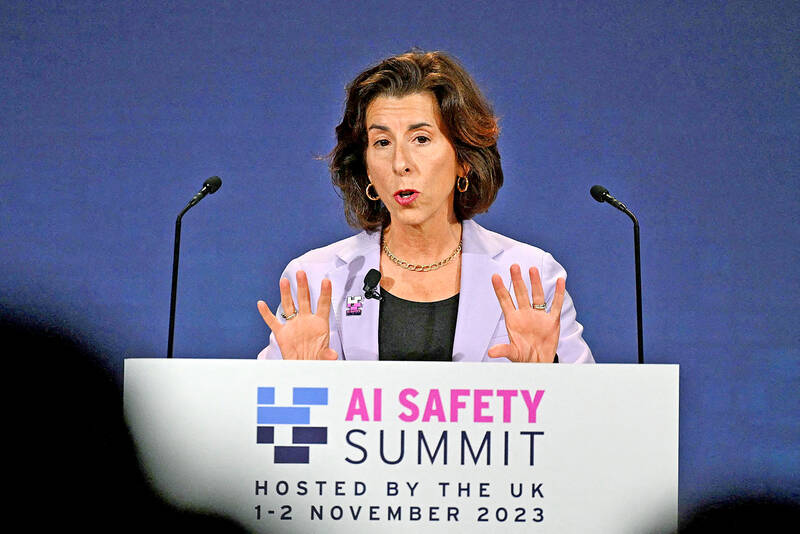The White House is proposing requiring US cloud companies to determine whether foreign entities are accessing US data centers to train artificial intelligence (AI) models, US Secretary of Commerce Gina Raimondo said on Friday.
“We can’t have non-state actors or China or folks who we don’t want accessing our cloud to train their models,” Raimondo said in an interview.
“We use export controls on chips,” she said. “Those chips are in American cloud data centers, so we also have to think about closing down that avenue for potential malicious activity.”

Photo: Reuters
US President Joe Biden’s administration is taking a series of measures to prevent China from using US technology for AI, as the burgeoning sector raises security concerns.
The proposed “know your customer” regulation was released on Friday for public inspection and is to be published tomorrow.
“It is a big deal,” Raimondo said.
The US is “trying as hard as we can to deny China the compute power that they want to train their own [AI] models, but what good is that if they go around that to use our cloud to train their models?” she said.
Last month, Raimondo said that the US Department of Commerce would not allow Nvidia Corp to ship its “most sophisticated, highest-processing-power AI chips, which would enable China to train their frontier models.”
The US government is worried about China developing advanced AI systems on a variety of national security grounds and has taken steps to stop Beijing from receiving cutting-edge US technologies to enhance its military.
The proposal would require US cloud computing companies to verify the identity of foreign persons who sign up for or maintain accounts that utilize US cloud computing through a “know-your-customer program or customer identification program.” It would also set minimum standards for identifying foreign users and would require cloud computing firms to certify compliance annually.
Raimondo said that the US cloud computing companies “should have the burden of knowing who their biggest customers are training the biggest models, and we’re trying to get that information. What will we do with that information? It depends on what we find.”
Biden in October last year signed an executive order requiring developers of AI systems that pose risks to US national security, the economy, public health or safety to share the results of safety tests with the US government before they are released to the public.
The commerce department plans to soon send those survey requests to companies.
Raimondo said that companies would have 30 days to respond.
“Any company that doesn’t want to comply is a red flag for me,” she said.
Carl Szabo, general counsel at NetChoice, a tech industry trade group, said that the commerce department is implementing Biden’s “illegal” executive order “to force industry reporting requirements for AI.”
He added that requiring US cloud companies to report use of their resources by non-US entities “for training large language models could deter international collaboration.”

CHAOS: Iranians took to the streets playing celebratory music after reports of Khamenei’s death on Saturday, while mourners also gathered in Tehran yesterday Iranian Supreme Leader Ayatollah Ali Khamenei was killed in a major attack on Iran launched by Israel and the US, throwing the future of the Islamic republic into doubt and raising the risk of regional instability. Iranian state television and the state-run IRNA news agency announced the 86-year-old’s death early yesterday. US President Donald Trump said it gave Iranians their “greatest chance” to “take back” their country. The announcements came after a joint US and Israeli aerial bombardment that targeted Iranian military and governmental sites. Trump said the “heavy and pinpoint bombing” would continue through the week or as long

TRUST: The KMT said it respected the US’ timing and considerations, and hoped it would continue to honor its commitments to helping Taiwan bolster its defenses and deterrence US President Donald Trump is delaying a multibillion-dollar arms sale to Taiwan to ensure his visit to Beijing is successful, a New York Times report said. The weapons sales package has stalled in the US Department of State, the report said, citing US officials it did not identify. The White House has told agencies not to push forward ahead of Trump’s meeting with Chinese President Xi Jinping (習近平), it said. The two last month held a phone call to discuss trade and geopolitical flashpoints ahead of the summit. Xi raised the Taiwan issue and urged the US to handle arms sales to

BIG SPENDERS: Foreign investors bought the most Taiwan equities since 2005, signaling confidence that an AI boom would continue to benefit chipmakers Taiwan Semiconductor Manufacturing Co’s (TSMC, 台積電) market capitalization swelled to US$2 trillion for the first time following a 4.25 percent rally in its American depositary receipts (ADR) overnight, putting the world’s biggest contract chipmaker sixth on the list of the world’s biggest companies by market capitalization, just behind Amazon.com Inc. The site CompaniesMarketcap.com ranked TSMC ahead of Saudi Aramco and Meta Platforms Inc. The Taiwanese company’s ADRs on Tuesday surged to US$385.75 on the New York Stock Exchange, as strong demand for artificial intelligence (AI) applications led to chip supply constraints and boost revenue growth to record-breaking levels. Each TSMC ADR represents

State-run CPC Corp, Taiwan (CPC, 台灣中油) yesterday said that it had confirmed on Saturday night with its liquefied natural gas (LNG) and crude oil suppliers that shipments are proceeding as scheduled and that domestic supplies remain unaffected. The CPC yesterday announced the gasoline and diesel prices will rise by NT$0.2 and NT$0.4 per liter, respectively, starting Monday, citing Middle East tensions and blizzards in the eastern United States. CPC also iterated it has been reducing the proportion of crude oil imports from the Middle East and diversifying its supply sources in the past few years in response to geopolitical risks, expanding